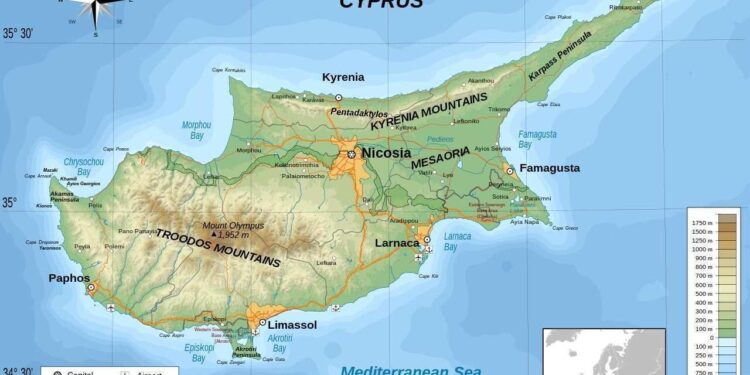Cyprus has disclosed that it has been approached by Iran to relay certain messages to Israel, Reuters reports. The development highlights the island nation’s emerging role as an intermediary amid ongoing regional tensions. Details on the content and intent of the messages remain limited, but the move underscores the complex diplomatic dynamics between Tehran and Jerusalem.
Cyprus Acts as Diplomatic Intermediary Between Iran and Israel Revealing Sensitive Communications
Cyprus has emerged as a crucial diplomatic channel amidst escalating tensions in the Middle East, tasked by Iranian officials to transmit discreet communications to Israel. This unprecedented involvement reflects the island nation’s strategic position and its historical role as a neutral intermediary in regional affairs. Sources close to the negotiations emphasize that the messages are of a sensitive nature, indicating Iran’s willingness to explore backdoor diplomacy while avoiding direct confrontation in the international spotlight.
The content and intent of these communications remain confidential, yet analysts suggest they could cover key topics such as:
- Potential ceasefire terms or de-escalation proposals
- Economic or security assurances to prevent open conflict
- Frameworks for future negotiations under third-party oversight
| Stakeholder | Role | Current Status |
|---|---|---|
| Cyprus | Diplomatic intermediary | Engaged in message transmission |
| Iran | Message originator | Seeking indirect dialogue |
| Israel | Message recipient | Reviewing proposals |
Analysis of Iran’s Messages to Israel and Potential Regional Implications
Iran’s decision to use Cyprus as an intermediary to communicate with Israel adds a complex layer to the already volatile Middle Eastern geopolitical landscape. This move signals a possible softening in Tehran’s stance or at least a willingness to explore indirect dialogues without formal diplomatic engagement. Analysts suggest that these messages, while shrouded in ambiguity, might revolve around security concerns, regional conflicts, or mutual interests such as de-escalation of tensions in contested zones like Syria and Lebanon. The choice of Cyprus-a geographically strategic and relatively neutral party-highlights Tehran’s preference for discreet channels amidst heightened sanctions and diplomatic isolation.
Potential regional implications of this communication effort could be significant. First, it may serve as a precursor to back-channel negotiations aimed at reducing hostilities, possibly influencing the broader Israeli-Arab relations spectrum. Second, such messaging may trigger varied responses among Iran’s regional allies and adversaries, affecting alignment and power dynamics in the Gulf and Eastern Mediterranean. Lastly, the development has the potential to impact international diplomatic strategies, especially those of the U.S., Russia, and the EU, who maintain vested interests in stability and security amidst ongoing conflicts.
- Diplomatic signaling: Iran testing indirect communication to gauge Israel’s openness.
- Security recalibration: Potential for reduced military escalations along shared borders.
- Regional balance: Influences alliances and proxy conflicts across the Middle East.
- International mediation: Opens space for external actors to facilitate dialogue.
| Aspect | Possible Outcome | Stakeholders |
|---|---|---|
| Message Content | De-escalation proposal or warning | Iran, Israel, Cyprus |
| Regional Stability | Improved or further unstable | Middle East nations |
| International Reaction | Diplomatic engagement or skepticism | US, EU, Russia |
Recommendations for Enhancing Diplomatic Channels Amid Rising Middle East Tensions
In light of recent developments involving Cyprus acting as an intermediary between Iran and Israel, it becomes imperative to strengthen existing diplomatic channels through more structured and transparent communication platforms. Governments should prioritize the establishment of multilateral dialogue forums that encourage direct exchanges while minimizing misunderstandings in this volatile climate. These platforms could incorporate regular confidential briefings, allowing stakeholders to relay critical messages swiftly without escalating public tensions.
Moreover, investing in backchannel diplomacy mechanisms can offer flexible, discreet avenues for negotiation, helping reduce hostility without the pressures of public scrutiny. Key recommendations include:
- Designating trusted neutral parties to act as reliable messengers.
- Utilizing encrypted digital tools to ensure secure communication.
- Implementing confidence-building measures to foster mutual trust.
- Encouraging regional cooperation forums focused on crisis management.
| Strategy | Objective | Expected Impact |
|---|---|---|
| Neutral Mediation | Enhance trust between conflicting parties | Reduced misunderstandings |
| Secure Digital Channels | Maintain confidentiality of sensitive talks | Prevention of information leaks |
| Confidence-building Measures | Lower risk of inadvertent escalations | Greater cooperation |
| Regional Crisis Forums | Facilitate multilateral conflict resolution | Long-term stability |
In Summary
As the situation evolves, Cyprus’s role as a conduit for communication between Iran and Israel highlights the complex diplomatic undercurrents shaping Middle Eastern relations. Further developments will be closely watched by international observers, given the potential implications for regional stability and security.
















